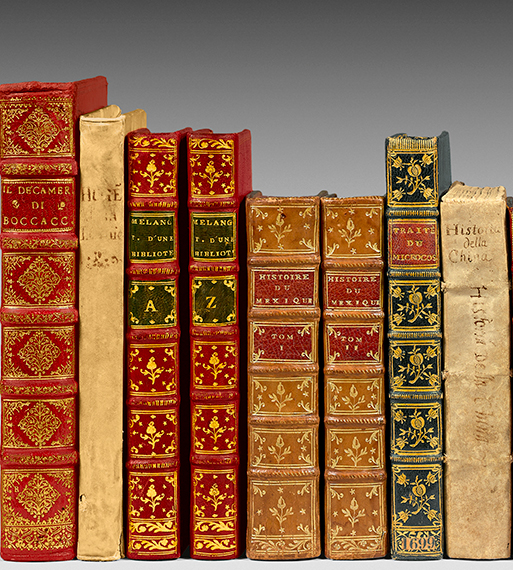The most famous treatise on perfumes
preserved in its marbled calf binding from the period.
Ex-libris from the library of the Viscount Émile de Guizelin.
[Barbe, Simon]. The Royal Perfumer, or Treatise on Perfumes, Of the Most Beautiful Secrets that Enter into their Composition, & the Distillation of Fragrant Waters & other Precious Liquors. New edition, revised, corrected, & considerably augmented.
In Paris, at the palace, at Saugrain, 1761.
In-12 of (1) f., 242 pp. counted badly 142, (2) ff., marbled calf, spine with raised bands decorated with gilt fillets and floral motifs, title piece of Bordeaux morocco, marbled edges. Binding of the period.
161 x 94 mm.
Second augmented original edition of the “Royal Perfumer” attributed to Simon Barbe, a 17th-century perfumer.
This famous book opens with the Treatise on perfumes and the most beautiful secrets that enter into their composition (pp. 1-86); followed by the Treatise of all different sorts of soaps (pp. 87 to 105); the Treatise on pomades (pp. 106-124); the Treatise on hair powders (pp. 125-140); the Treatise on large Violet Powders (pp. 141-159); The Treatise on Scented Waters (pp. 160-174); the Treatise on Lozenges to burn (pp. 175-179); the Treatise on Liquors & Perfumes for the Mouth (pp. 180-204): in this chapter are found recipes of Ratafias and other mouth liquors. Finally, the Treatise on distillation (pp. 205-226).
Simon Barbe, who lived in Paris, rue des Gravilliers at la Toison d’Or, was undoubtedly the most famous perfumer of his century. He wrote two perfumery manuals, recording his knowledge and expertise. The first, Le Parfumeur français, composed for non-professionals with the idea of teaching everyone how to compose perfumes, especially for “the entertainment of Nobility, the utility of Religious people” was published in 1693.
In 1699, he wrote his second treatise, The Royal Perfumer, this time intended for professionals. He presents this work as useful to “those who gather flowers and necessary to glovemakers, wigmakers, and liquor merchants“. Here, no more dedication, no more preface; the author no longer pretends to write for the amusement of the nobility, nor for the utility of religious people. One senses that the vogue for perfumes has ended. What caused this reversal? They had the misfortune of inconveniencing Louis XIV. From then on, everything was over for them. “As the King does not like scents, says Marana, everyone feels obliged to hate them; the ladies pretend to faint at the sight of a flower“.
Precious copy of this treatise on perfumes preserved in its marbled calf binding from the period.
Ex-libris from the library of the Viscount Émile de Guizelin.

